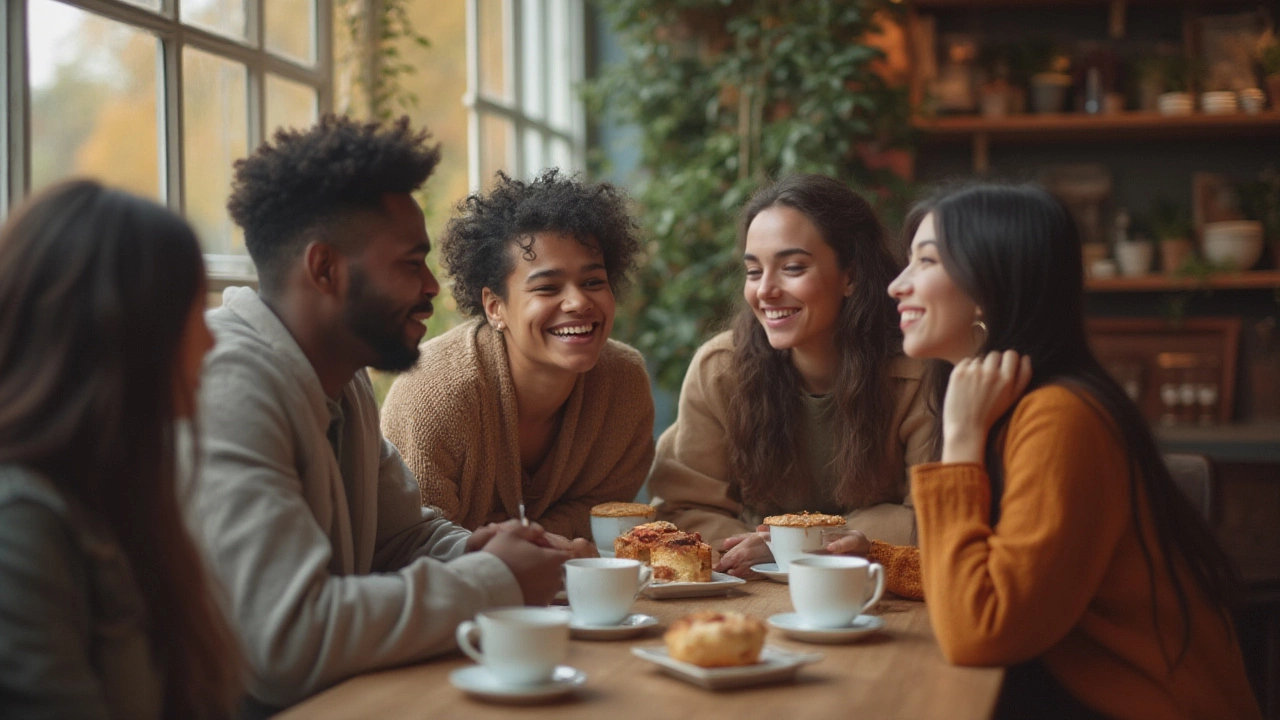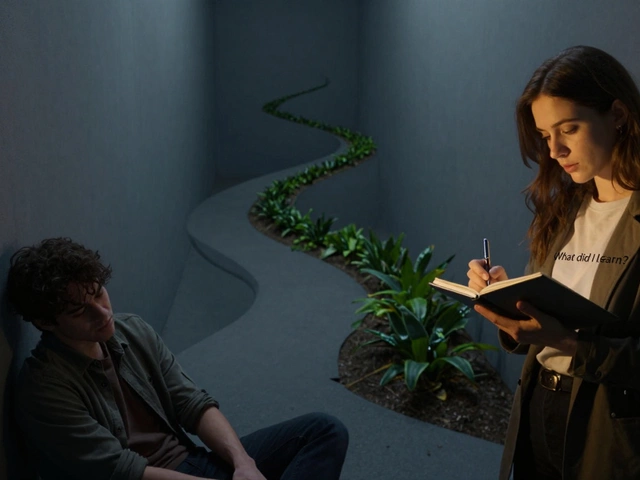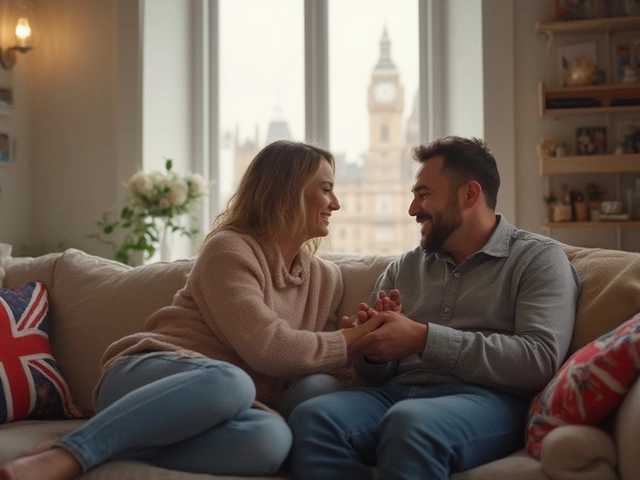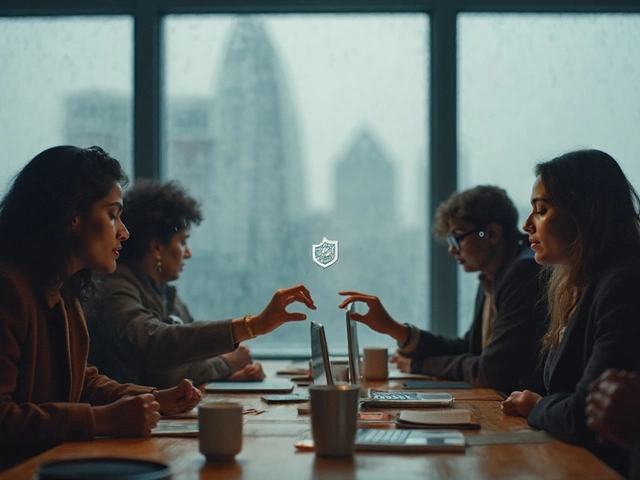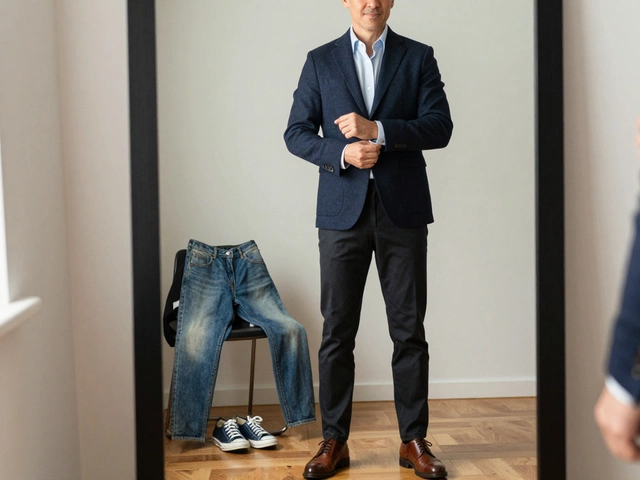You’d think “girlfriend” would be simple. But these days, the label almost never comes with a manual. Ask ten people what a girlfriend is and you'll get ten wildly different takes. Some see it as a casual step up from “hanging out.” Others only use it when things are exclusive, serious, and heading toward trust-falls and toothbrushes left at each other's apartments. And if you’ve spent any time swiping or texting, you know how confusing signals and labels can be. Culturally, emotionally, and romantically, what it means to have—or be—a girlfriend is shifting. A recent Pew study found that over 50% of young adults have ambiguous relationship statuses, with more folks talking about “situationships” than ever. All this makes a girlfriend so much more than just a title.
What Does It Mean to Call Someone Your Girlfriend?
Calling someone your girlfriend used to mean exclusivity by default, but the lines have blurred. Some couples use this label after a handful of dates; others hold off until feelings are rock-solid. For many, the label signals commitment and a next-level emotional investment—think meeting the parents or posting couple pics with matching hoodies.
Labels, like “girlfriend,” set boundaries and expectations. They help both people know where they stand, clarifying if it’s just fun or something deeper. But it’s also easy to forget that everyone brings their own expectations to the word. For some, it means monogamy; for others, it’s all about emotional support and closeness, no matter the label. The trick? Make sure you’re both actually talking about the same thing when you go official.
What Makes a Girl a "Girlfriend"?
What separates “someone I date” from “my girlfriend”? Most people say it comes down to trust, communication, and mutual intention. You’re not just hanging out for fun. There’s a real emotional connection. You care about each other’s lives, want to know how her day went (even if it was just Zoom meetings), and plan future stuff together—like concerts, mini-vacays, or just next weekend’s brunch.
Exclusivity is usually a big part, but not always. Some couples discuss what exclusivity looks like for them—open or closed, seeing where it goes or ready for the ‘gram. It also comes with a sense of mutual effort; you both want this to work. If you’re calling her your girlfriend but still unsure about being seen together at the mall, maybe hit pause and ask yourself why.
Who Is a Girlfriend to a Boy?
From a guy’s side, “girlfriend” can mean emotional safety: someone who has his back, listens to his rants about work, and laughs at his goofy jokes. It’s often about having a teammate—a partner who supports, challenges, and sometimes even roasts him, but always in a way that builds each other up.
It’s bigger than just romance. For lot of guys, being able to trust, confide, and grow with someone who genuinely cares is what makes a girl girlfriend material. Of course, guys feel pressure too. The role has all sorts of unspoken rules, like being a good communicator, providing, protecting, or acting as the “man”—but not in a controlling way. Relationships these days are less about gender roles and more about authenticity.
What Is GF in Love? (And What It Isn’t)
Ever spot “GF” in a text or bio and wonder—what’s she really after, a title or real affection? “GF” can be shorthand for “girlfriend,” but in the world of love languages, it’s more than just a word. It often means someone who understands your quirks, shows up on hard days, and gets your memes (bonus points if she laughs).
But here’s the catch: “GF” isn’t a one-size-fits-all role. It doesn’t give someone automatic rights to your time, energy, or body. It’s a dynamic that grows out of trust, respect, and attraction—not just a social signal for Instagram followers. And if you’ve ever wondered about the difference between a real girlfriend and a “girlfriend experience,” you’ll find all the ins and outs on sites explaining what is gfe.
What Is the Full Form of Girlfriend?
Slang-wise, “GF” is everywhere, but the full word—girlfriend—packs more emotional punch. When you hear the literal meaning, it’s “girl” + “friend,” but the combo almost never means “just friends.” It’s shorthand for a romantic, usually exclusive connection. But the emotional weight shifts: for some, it’s a term of endearment; for others, it’s nearly sacred—a sign of trust, commitment, and belonging.
Don’t get caught up on acronym trends or wordplay. The real test is how it feels when you say it. Do you feel proud to introduce her as your girlfriend—like it’s an upgrade, not a job title?
What Is the Girlfriend Effect?
Here’s a wild fact: there’s real science behind the “girlfriend effect.” Studies show guys in relationships not only appear more attractive but also report higher emotional wellbeing. Some researchers say having someone invested in your social life boosts confidence—and influences how others perceive you. It’s like guys get a glow-up just from being seen as boyfriend material.
Social circles notice it too. Suddenly, you’re “taken,” and that creates new positive attention—sometimes from people who never looked twice before. The girlfriend effect isn’t just looks or status; it’s about stability. Friends often say guys with steady relationships make better listeners and teammates. The invisible perks? A built-in support system and—if you’re lucky—someone reminding you your shirt actually doesn’t match your tie.
| Aspect | With Girlfriend | Single |
|---|---|---|
| Self-Confidence | Higher | Lower |
| Social Perception | More Positive | Neutral |
| Physical Health | Improved | Stable |
| Longevity | Longer | Average |
Is Having a Girlfriend Important?
There’s a myth out there that having a girlfriend means you’ve “made it.” But real life isn’t a sitcom or a rom-com. Happiness doesn’t start only once you’re in a relationship. Self-worth isn’t defined by your relationship status. Science backs this up: studies from Harvard found strong friendships make people just as happy as romantic partners—sometimes more so when there’s less drama.
The pressure to find “the one”—or any one—can take a toll on your confidence. It’s normal to want romance, but building your own identity and sense of happiness first matters even more. If you’re in a relationship just to avoid feeling alone, odds are the loneliness will stick around. Relationships work best when both people are happy with themselves first.
How to Find a Girlfriend?
Looking for a girlfriend today is its own adventure. Gone are the days when you waited at the school dance or got set up by friends. Now? It’s dating apps, social media, and endless group chats. But real-life success doesn’t just depend on picking the right app—it’s about confidence and communication. Before you even send that first message, ask yourself: what do I bring to the table? Being self-aware and open to growth makes you much more appealing.
Once you’re in, honesty is everything. Start with genuine conversations. Don’t just copy-paste “hey” to ten different girls. Tailor your approach—comment on something specific from her profile or ask an offbeat question. If you’re more the analog type, join clubs or try new hobbies where you’ll meet women naturally.
- Work on your self-esteem first
- Expand your social circles—friends, hobbies, volunteering
- Take rejection as feedback, not a crisis
- Use dating apps with intention, not just boredom
How to Attract a Girl for a Relationship?
It’s less about the six-pack and more about attitude. Confident, funny, well-groomed guys tend to do well—not because of their looks, but because they carry themselves with purpose. Show interest in her story, not just her looks. Small gestures—remembering her coffee order, listening to her playlist recs—matter more than big flashy dates.
Emotional intelligence is a huge plus. If you can read the room, pick up on her mood, and respond with empathy instead of ego, you’re already miles ahead. Consistency and reliability—texting back, making plans, keeping promises—build trust.
How to Tell If a Girl Likes You?
If you’re always wondering, “Does she like me or is she just being nice?” watch for these clues. Girls who like you tend to make eye contact, laugh a little louder at your jokes, and find reasons to touch your arm or linger in conversation. Their texting style changes—quick replies, emojis, longer messages, or sharing memes late at night.
- She initiates conversation
- Keeps the chat going after answering your question
- Makes playful or teasing comments about your interests
- Finds excuses to hang out—extra projects, study sessions, or coffee runs

How to Talk With a Girl (Without Being Awkward)
Nobody’s born a smooth talker. The real secret? Listen more than you speak. When you start a conversation, skip the cheesy pickup lines and ask open-ended questions. The key is to talk “with” her, not “at” her. And if you mess up, own it with a laugh—self-deprecating humor breaks most tense moments.
Avoid rapid-fire interview mode. Let the chat flow naturally—share a story from your day, ask her thoughts, and dig deeper if she gives you an interesting answer. Body language counts, too: eye contact, relaxed posture, and genuine smiles open doors. And if you hit an awkward pause? Don’t panic. A little silence gives her a chance to share more.
How to Make a Girl Fall for You?
You can’t force feelings, but you can build connection. Show respect, not just in words but in actions. Share things about your own life—hopes, fears, even silly moments. This builds vulnerability, which is magnetic. Girls want to feel seen and heard, not just flattered.
Trust takes time. Be consistent. Celebrate her victories, support her struggles, and treat her as a partner, not a project. If she opens up about her family or dreams, remember the details. Small acts—like cheering her on during an exam or sending a goofy meme after a rough day—stack up to emotional trust.
What Is "GF Material"? What Do Girls Look For in Guys?
Think “relationship material” is about good looks or Insta fame? Here’s what most girls actually say they want: reliability, honesty, humor, and ambition. Women are looking for guys who are comfortable in their own skin and bring positive energy into the relationship.
Consistency beats flashiness. Being thoughtful and dependable goes a long way. It’s the guy who texts back, remembers her big interview, and treats everyone with kindness—waiters, friends, family—who stands out. Showing you can grow with her, challenge her, and still respect her boundaries is the real gold standard.
Flirty or Serious? When a Girl Says “We’ll See”
Few things are more confusing than the “we’ll see” response. Is it a polite brush-off, a real maybe, or a clever way to keep you guessing? Usually, it means she’s interested but not ready to commit—or she wants to see more genuine effort before giving a straight answer.
Don’t pressure her for certainty. If she says “we’ll see,” stay respectful, keep the conversation natural, and watch her actions. If she keeps texting, making plans, or laughs at your jokes, you’re still in the game. If not, back off and focus on your own growth.
How to Turn Your Girlfriend’s Mood Around?
Moods swing. You can’t always “fix” a bad day, but you can help. Start by asking if she wants to talk or just needs company. Listen without jumping to solutions—most of the time, she just wants to vent.
Offer comfort—a hug, her favorite snack, or silly memes work wonders. Avoid downplaying her feelings or acting distracted. Sometimes, acknowledging her mood is the fix. Try: “I’m here for you, whatever you need.” That’s often enough.
21 Questions to Ask Your Girlfriend (or Future One)
- What’s your happiest childhood memory?
- If you could travel anywhere tomorrow, where would it be?
- What’s your go-to comfort food?
- Is there anything you wish more people understood about you?
- Biggest dream you have right now?
- What’s your favorite way to relax?
- If you won the lottery, what’s the first thing you’d do?
- What music do you secretly love?
- Who inspires you most?
- What’s one thing you’d redo if you could?
- Funniest moment from your last week?
- Favorite season and why?
- What scares you the most?
- How would you spend a lazy Sunday?
- Weirdest thing about you?
- If you had a superpower, which one?
- How do you handle stress?
- What’s a cause you care deeply about?
- Best compliment you’ve ever received?
- Your favorite thing we’ve done together?
- Where do you see yourself in five years?
What If Flirty Questions Go Too Far?
Flirting’s a tightrope: one moment cute, the next a cringe-fest. The trick is context. If your jokes or questions make her uncomfortable—she changes the subject, types one-word replies, or pulls away—it’s time to back off. Consent isn’t just for physical stuff. Emotional safety matters, too.
Keep things playful, light, and genuine. If you cross a line, acknowledge it and apologize. Flirty banter should make both people feel seen, not awkward. Pay attention to her reactions, not just your punchlines.
Can You Kiss Your Girlfriend in Public (or in Islam)?
Kissing in public is a global toss-up. In some places, holding hands is barely noticed; in others, even a brief kiss could draw stares or warnings. In many Muslim cultures—including Sharia-influenced countries—public displays of affection (PDA) are frowned upon and sometimes even illegal. Respect for local customs and rules is non-negotiable.
If you’re dating across cultures, talk openly about comfort zones. Agree on what feels good and safe for both of you—private moments might be more meaningful anyway. When in doubt, err on the side of respect for her boundaries and cultural context.
How to Kiss a Girl (The Respectful Way)
You’ve got to read the vibes before leaning in. If she makes steady eye contact, smiles, and sticks around without backing away, the green light is likely. Always look for non-verbal cues—like facing you, mirroring your moves, or relaxing her posture. Consent is sexy.
Go slow. If you’re unsure, just ask: “Would it be okay?” Simple, direct, powerful. When the magic moment strikes, start with a soft lip kiss. Let it build naturally—rushing is the #1 mood-killer. Stay relaxed and keep breathing (seriously).
What Is a Lip Kiss vs Tongue Kiss vs Love Bite?
- Lip Kiss: Soft, sweet, and usually the first step. It’s all lips, no pressure, perfect for starting or ending a date.
- Tongue Kiss (French Kiss): More intimate, with both lips and tongue involved. Best only when you’re sure you have chemistry and privacy.
- Love Bite (Hickey): A playful or passionate bite, leaving a mark. Not for everyone and definitely not on the first date—best to check if she’s into this before going there!
Knowing which kiss to use—and when—comes down to reading her vibe. Err on the side of less, and let her lead if you’re not sure.

Is Kissing Good for Health? (Science Says Yes)
Kissing does more than spark romance—it actually has impressive health perks. Studies found kissing lowers stress, boosts dopamine (the “feel-good” brain chemical), and even helps your immune system. There’s evidence that couples who kiss often report better relationship satisfaction and less stress-induced headaches.
Physically, kissing increases heart rate (in a good way) and burns a few calories—up to 6 per smooch! Saliva exchange can help expose your body to tiny, harmless germs, which may make your immune system stronger over time. Talk about a win-win: affection plus better health. So, if you needed an excuse to kiss your girlfriend more often, science says go for it.

